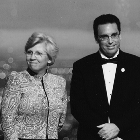Sutherland Institute will honor Bishop Wester

SALT LAKE CITY — The Sutherland Institute will present the Most Rev. John C. Wester, Bishop of the Diocese of Salt Lake City, with the Religion Award. They will present Bishop Wester with the Religion Award at the 2009 Legacy Awards Dinner May 13, at the Rice-Eccles Stadium and Towers. This event is a black tie affair. "This is the first Religion award we are giving," said Paul Mero, Sutherland Institute president. "In this state there are a lot of possibilities, but we thought the first award should go to Bishop Wester. He has done so much in building bridges between faith communities, and worked well with other faith communities on specific public policy issues like protecting marriage, and immigration. "We also give one broader Legacy Award, which this year will go to Lavell and Patti Edwards," said Mero. "We are also giving a Family Award to Alan and Suzanne Osmond for their work in support of family as the fundamental unit of society. "Sutherland Institute is a conservative think tank; a public policy group," said Mero. "We were founded by the late Gaylord Swim in 1995. We have always been in Utah and we only look at Utah issues unless a federal, national, or international issue has such great impact on Utah that it becomes a Utah issue." Mero said Sutherland is a non-profit organization supported by individuals’ donations through their own households or through foundations they have created. "We are three things," said Mero. "We are conservative, meaning we believe in the power of civil society to solve community problems as opposed to the government. We deal with a broad range of issues such as family issues, transportation, taxes, energy, and anything that is of public interest. Mero said they emphasize the power of civil society and civil institutions like the family, local neighborhoods, churches, voluntary organizations, and civic associations. "We believe that people using their own free will and their own initiative can build community much better than a government-driven solution," said Mero. "We are trying to get decision makers and community leaders to see that real people can have great influence in the community. You do not have to be a politician, or have the State Legislature, to affect change. That way everybody gets to work out their own lives. "We are also independent. We are not a political party, we are not in anybody’s pocket, we do not accept government money, and we do not do contract work, meaning we are not guns for hire to get certain ideas passed at the Legislature," said Mero. "No one can call me and order me to do something that is against our governing principles. "Finally, we try not to get involved in partisan politics," said Mero. "But we are involved at the State Legislature, and we do get involved, as needs be, with other levels of government such as city councils, county councils, and school boards." Mero said what Sutherland does is come up with ideas that make Utah a better place to live, work, and raise a family. "When we come to work everyday, we come to work trying to come up with ideas that are framed by our seven governing principles," said Mero. "Then we take those ideas and try to implement them among decision makers in Utah." Mero said the seven governing principles include a strong belief in personal responsibility, limited government, free markets, private property, family as the fundamental unit of society, the power of charity to care for our neighbors in need, and the power of religion in our lives to create a sense of morality for us. Mero said what made the great totalitarians of the 20th century – Stalin, Hitler, and Mao – evil was the fact that they got rid of civil society, the intermediate layer of society between the individual and the state. When they did that, individuals no longer had a framework for their morality. So when you think of what these men did, mass murder human beings, you have to ask yourself, how did regular people allow that to happen? "How did the German people allow that to happen," asked Mero. "What happened was, Hitler dismantled civil society, and families, even though he used the rhetoric of fatherhood and family talk. He destroyed religion, destroyed the ability of labor unions to organize, and he destroyed the ability of average citizens to voluntarily associate. The state became the great arbiter of morality. As human beings, we all want to belong to something, and the only thing left to belong to was the state. "If your voice of morality was telling you it was all right to kill people, then you would go to work and kill people, then come home, hug your children, and act like nothing was wrong," said Mero. "As a community, religion helps create a moral framework. "At Sutherland, we have decided to give awards that embody our governing principles," said Mero. "We are giving Bishop Wester the Religion Award because the Sutherland Institute and Bishop Wester both agree we need to protect marriage, and the best way to cope with individuals who are living in Utah undocumented, is to bring them to the surface of society and give them a helping hand, not shun them. So particularly on those two issues, we felt Bishop Wester was an excellent candidate to receive this award. "Each recipient is an embodiment of one or more of our governing principles," said Mero. "The recipient of the Legacy Award embodies several of the principles, and it is always given to a couple. "This is the third year of our Legacy Awards Dinner, which began in 2007," said Mero. "We expect about 300 people including elected officials, community leaders, and family and friends of the recipients. It will be a wonderful night."
© Copyright 2024 The Diocese of Salt Lake City. All rights reserved.

Stay Connected With Us